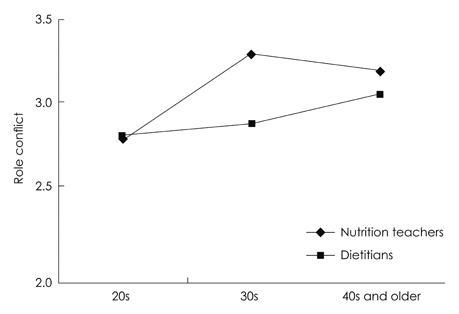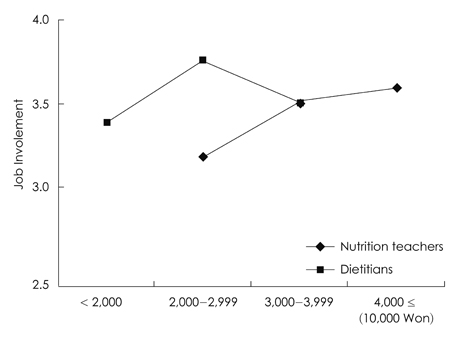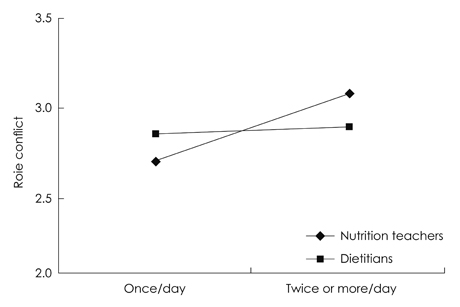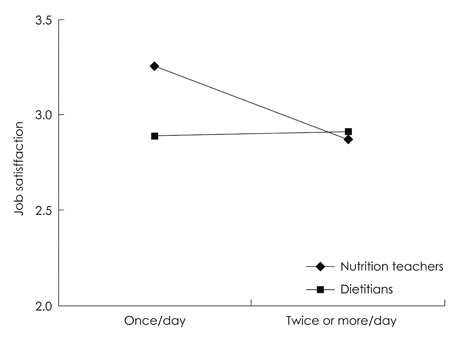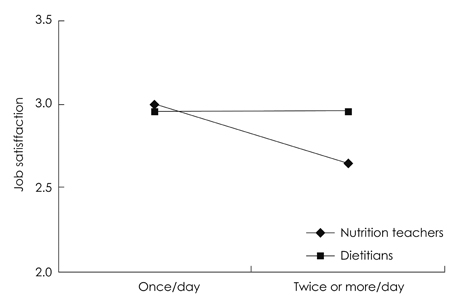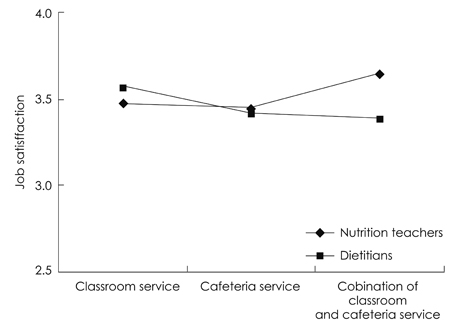Korean J Nutr.
2012 Feb;45(1):64-79. 10.4163/kjn.2012.45.1.64.
Comparison of Role Conflict, Self-Efficacy, Job Satisfaction, and Job Involvement between Nutrition Teachers and Dietitians at School Food Service in Incheon Metropolitan City: Focusing on the Interactions between Nutrition Teachers and Dietitians
- Affiliations
-
- 1Department of Food and Nutrition, College of Human Ecology, Inha University, Incheon 402-751, Korea. kjchang@inha.ac.kr
- KMID: 2268624
- DOI: http://doi.org/10.4163/kjn.2012.45.1.64
Abstract
- The purpose of this study was to compare differences in role conflict, self efficacy, job satisfaction, and job involvement perceived by school nutrition teachers and dietitians. A total of 335 female school nutrition teachers and dietitians from Incheon area were surveyed by a self-report questionnaire in November 2010. Collected data were processed using SPSS 15.0. The reliability of the questionnaire was tested and differences between the two groups were analyzed using the Student's t-test, the chi-square test, and a two-way analysis of variance (ANOVA). The job satisfaction level of nutrition teachers was higher than that of dietitians. The effect of role conflict and job satisfaction for nutrition teachers and dietitians was different according to age. In addition, self-efficacy, job satisfaction, and job involvement of nutrition teachers and dietitians were influenced by their annual salaries. The frequency of meals served also affected role conflict, job satisfaction, and job involvement of the nutrition teachers and dietitians, and the effect of job involvement by the nutrition teachers and dietitians was different according to meal service type. Therefore, it is necessary to establish strategies for resolving role conflicts among school foodservice specialists and improve their self-efficacy for enhancing consumer's satisfaction with the general quality of school food service. These efforts may contribute to job satisfaction and job involvement of food service specialists and ultimately to the productivity of food service and the establishment of food service specialist roles.
Keyword
MeSH Terms
Figure
Reference
-
1. Chin JH. A study on role conflict, self-efficacy, job satisfaction and job involvement perceived nutrition teachers and dietitian at school [dissertation]. 2011. Incheon: Inha University.2. Ministry of Education, Science and Technology. School food service improvement scheme. 2007. Seoul:3. Han JK. A study on the present state of the duties of regular school nutritionists and irregular ones related to introduction of nutritionist system [Master thesis]. 2008. Suwon: Suwon University.4. Law for school feeding. 2011.5. Graen G. Dunnette MD, editor. Role-making processes within complex organizations. Handbook of Industrial and Organizational Psychology. 1976. Chicago: Rand McNally;1201.6. Kim M, Hong NH. The effects of role conflict and self efficacy on job satisfaction for hospital coordinators. Korean J Hosp Manage. 2009. 14(3):104–131.7. Kanungo RN. Measurement of job and work involvement. J Appl Psychol. 1982. 67(3):341–349.
Article8. Jun JK, Kim CS. The effects of role conflict and role ambiguity on job performance and job satisfaction among family restaurant employees. Korean J Tourism Res. 2002. 17(1):55–70.9. Jung GY. A study on role conflicts and coping strategies of chief teachers in secondary schools [Master thesis]. 2009. Gunsan: Kunsan National University.10. Kang SJ. Role conflict and job satisfaction of school health teachers [Master thesis]. 2008. Seoul: Kyung Hee University.11. Piko BF. Burnout, role conflict, job satisfaction and psychosocial health among Hungarian health care staff: a questionnaire survey. Int J Nurs Stud. 2006. 43(3):311–318.
Article12. Zhao L, Rashid H. The mediating role of work-leisure conflict on job stress and retention of it professionals. Acad Inf Manag Sci J. 2010. 13(2):25–41.13. Bandura A. Self-efficacy: toward a unifying theory of behavioral change. Psychol Rev. 1977. 84(2):191–215.
Article14. Jeong YS. Relationship with self-efficacy, goal-orientation, internal-external locus of control [Master thesis]. 2002. Seoul: Sookmyung Women's University.15. Judge TA, Bono JE. Relationship of core self-evaluations traits--self-esteem, generalized self-efficacy, locus of control, and emotional stability--with job satisfaction and job performance: a meta-analysis. J Appl Psychol. 2001. 86(1):80–92.
Article16. Kim YH, Im SY. The effect of role stress and self-efficacy on job satisfaction in long-term caregivers. J Fam Relat. 2011. 16(3):129–142.17. Klassen RM, Chiu MM. Effects on teachers' self-efficacy and job satisfaction: teacher gender, years of experience, and job stress. J Educ Psychol. 2010. 102(3):741–756.
Article18. Gwak HS. A study on the effect of top managers' leadership styles on organizational effectiveness in social welfare organizations [Master thesis]. 2007. Busan: Silla University.19. Bea JK. Study effective factors of employee's job satisfaction evidence from the service sector [Master thesis]. 2005. Gumi: Kyungwoon University.20. Simth DL, Smith LJ, Johnsey A. Quality of worklife: a study of the perceptions of school food service managers. School Food Serv Res Rev. 1990. 14(2):108–113.21. Locke EA. Dunnette MD, editor. The nature and causes of job satisfaction. Handbook of Industrial and Organizational Psychology. 1976. Chicago: Rand McNally;1300.22. Sung KH. A comparison and analysis of job satisfaction between regularly and irregularly employed school foodservice dietitians [Master thesis]. 2008. Changwon: Kyungnam University.23. Shin WM, Han JI, Kim SA. Factors influencing job satisfaction of dietitians (nutrition teachers) of school foodservice in Daejeon/Chungnam province. Korean J Community Nutr. 2009. 14(6):798–806.24. Lee MJ, Park SH, Joo N. A study on effectiveness of working condition's improvement after introducing the countermeasure for irregular employee. Korean J Food Cult. 2005. 20(6):652–660.25. Cho HH. A study on the effect of employee benefits on the job involvement [Master thesis]. 2007. Seoul: Hanyang University.26. Park SY. The study on the effects of an organizational commitment and the job involvement on the personal service quality [Master thesis]. 2007. Seongnam: Kyungwon University.27. Ryu IS. An empirical study on the effects of HR practices and employability on organizational commitment and job involvement of contingent workers [Master thesis]. 2006. Suwon: Ajou University.28. Han JK, Kim HS. Comparative study of the job satisfaction, job performance and job importance level of school nutrition teachers and school dietitians. Korean J Food Cult. 2009. 24(5):525–532.29. Lim JE. A study on working conditions and job satisfaction factors of contingent school foodservice dietitian in Jeonbuk area [Master thesis]. 2008. Iksan: Wonkwang University.30. Lee HJ. The correlation between LCSI (Lim's Character Style Inventory) and self-efficacy inventory [Master thesis]. 2009. Busan: Kyungsung University.31. Kim SG. The influence of worker's self-efficacy in self-sufficiency promotion center on organizational commitment [Master thesis]. 2008. Busan: Silla University.32. Gu KS. A study on job satisfaction of employees in elementary and middle schools [Master thesis]. 2007. Cheongwon: Korea National University of Education.33. Lee MN. A study on working conditions job satisfaction of contingent dietitians in school foodservice in Kyouggi-do Whasoung and Suwon area [Master thesis]. 2008. Suwon: Kyonggi University.34. Lee HN. A study on the relationships among personality type and job involvement by teachers [Master thesis]. 2009. Gyeongsan: Yeungnam University.35. Kim HS. A study on how pays satisfaction affects to the job satisfactions, job involvements, and turnover intention [Master thesis]. 2009. Iksan: Wonkwang University.36. Ministry of Education, Science and Technology. School account impairment of labor conditions. 2011. Seoul:
- Full Text Links
- Actions
-
Cited
- CITED
-
- Close
- Share
- Similar articles
-
- Job Stress among School Nutrition Teachers and Dietitians in Seoul during the Early Stage of the COVID-19 Pandemic: Effects on Self-Efficacy, Job Satisfaction, and Job Involvement
- Factors Influencing Job Satisfaction of Dietitians(Nutrition Teachers) of School Foodservice in Daejeon/Chungnam Province
- School Dietitian’s Job Satisfaction and Job Importance According to the School Types in Sejong City
- Comparison Analysis of School Foodservice Dietitians' Job Satisfaction, Work Value, and Turnover Intention Based on the Expectation to be a Nutrition Teacher
- Job analysis and satisfaction of dietitians, nutrition teacher in school foodservice by school type in Gwangju and Jeonnam area


